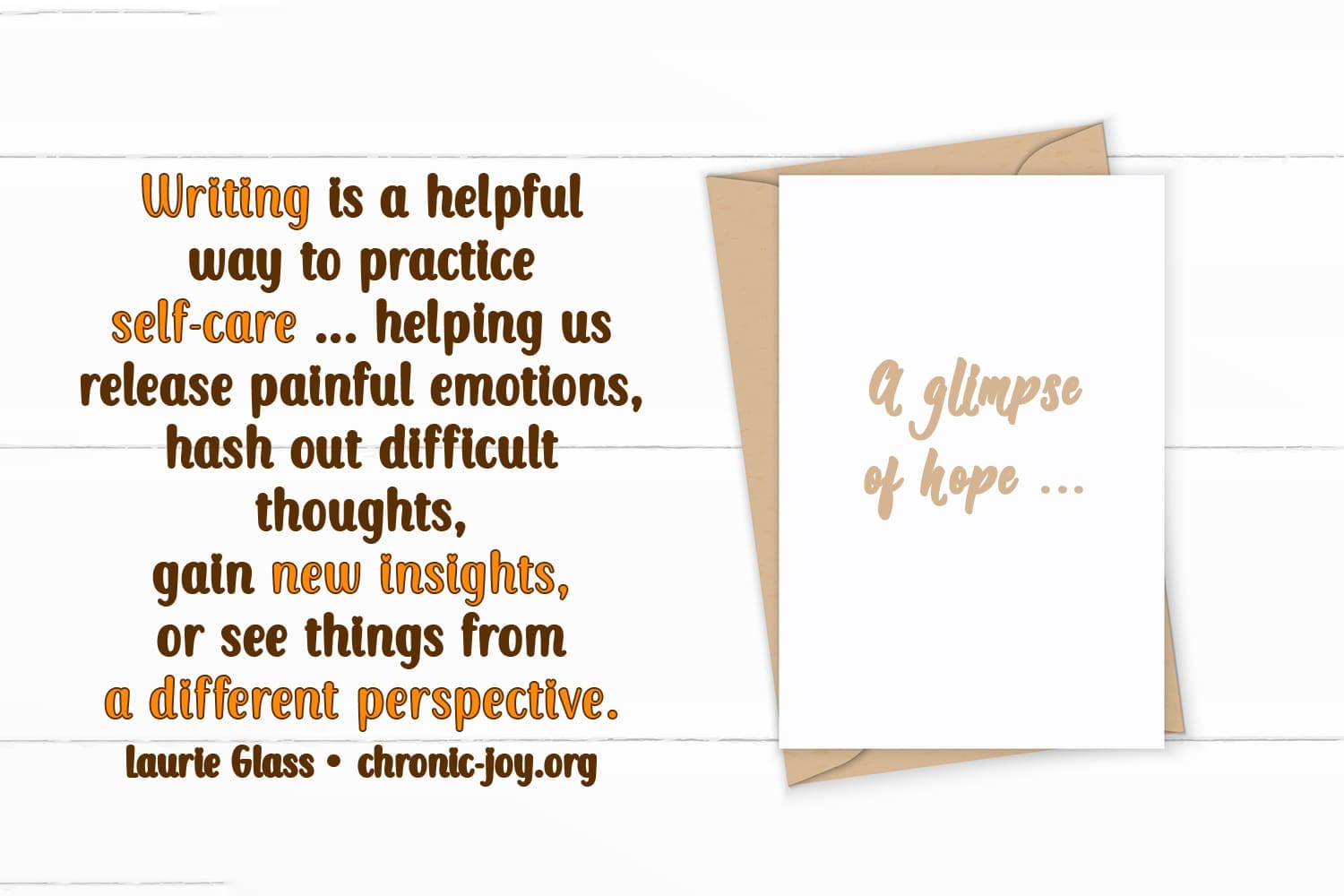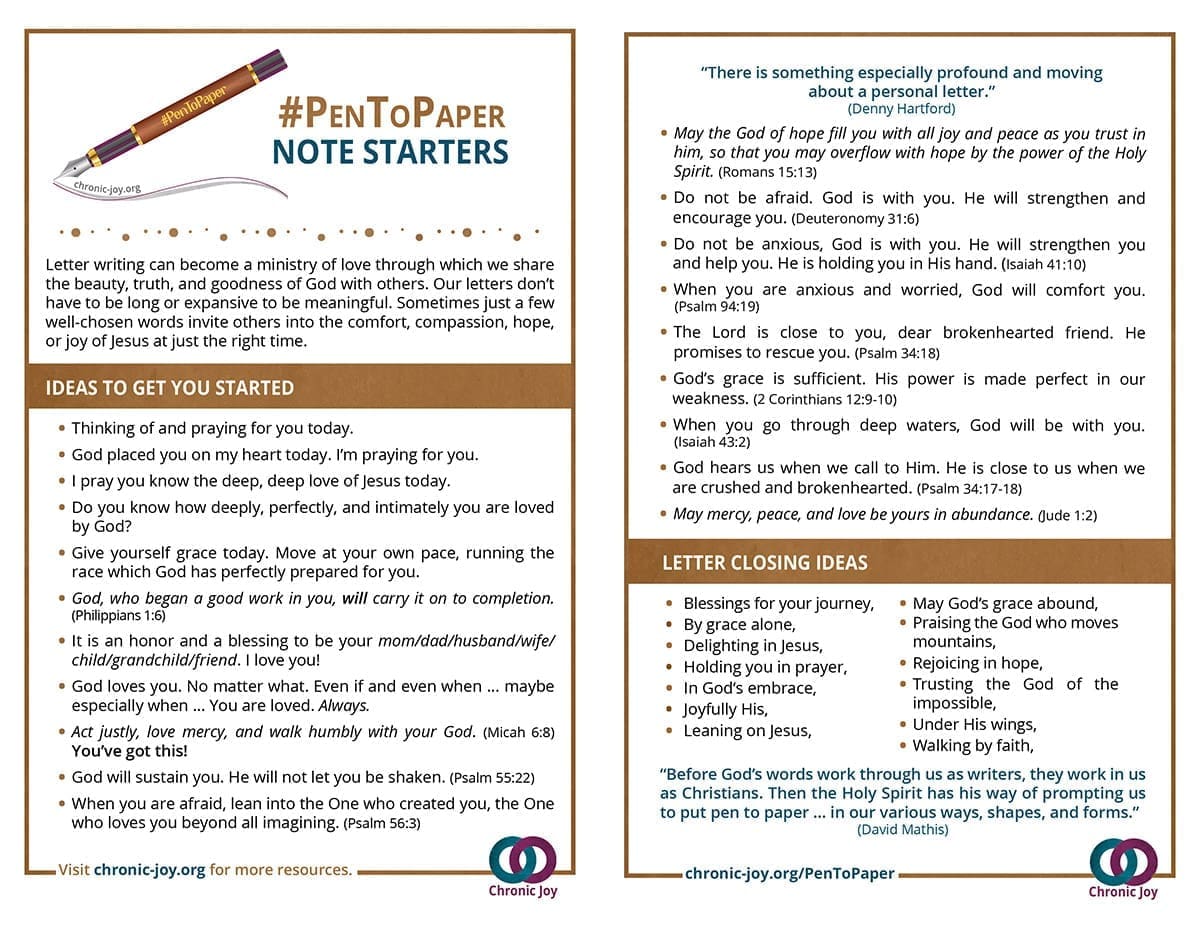
“Writing is a helpful way to practice self-care … helping us release painful emotions, hash out difficult thoughts, gain new insights, or see things from a different perspective.” Laurie Glass
Therefore I will not keep silent; I will speak out in the anguish of my spirit; I will complain in the bitterness of my soul. (Job 7:11)
WRITE LETTERS
Writing is a helpful way to practice self-care. This can be through creative writing, journaling, and even letter writing. These are not letters to send to others but letters to express your thoughts and feelings. Sometimes writing can help you release painful emotions, hash out difficult thoughts, gain new insights, or see things from a different perspective. Below you’ll find suggestions for writing four different types of letters.
FOUR TYPES OF LETTERS
LETTER TO THE ILLNESS
Tell the illness what you think about its appearance in your life and what it has taken from you. Be candid in describing how you feel about its intrusion. Hold nothing back. Then consider if there is a way you’ve grown or a lesson you’ve learned from this changed life and write about that. If you’d like, stand up to the illness; declare that although it may take many things away from you, it can’t take away the real you who lives inside. Also include things for which you are grateful, either because of the illness or despite it. These are suggestions – this is your letter, so include whatever expresses your heart the best.
LETTER TO GOD
As you write to God, you might include gratitude for what He’s shown you about Himself or ways He’s helped you to grow through this difficult experience. Consider writing about His attributes and what they mean to you. Express any commitments you want to make to Him. You can talk about how you’re working on accepting unanswered questions. You can share your struggles as well. It’s okay to write about the hard things as well as the good things.
LETTER TO SOMEONE WHO HAS HURT YOU
Write to someone who hasn’t believed you’re sick, has minimized what you’ve been through, or has hurt you in some other way. This is not intended to be a letter that you share with that person – it’s an exercise to help you express your disappointment, anger, inner pain, or whatever you feel. This exercise may also be one step toward healing as well as helping you to forgive that person.
LETTER TO YOURSELF
Include Bible verses and encouraging words you’ve read or someone has shared with you. Add understanding and uplifting comments that you’d tell someone else facing a debilitating illness or that you wish someone would say to you. You might also list the gifts and positive traits God has given you. Keep the letter handy, and refer to it when you need some compassion.
GIVE IT A TRY
Choose one idea and see how it goes. Write a series of the same type of letter if that seems to be a good fit for you. Perhaps you’ll think of an entirely different kind of letter you’d like to write. Do what benefits you the most. All the while, try your best to write without self-condemnation. It’s natural to have difficult thoughts and feelings to work through when navigating life with a chronic illness. Be honest about where you are and work from there. You might find that writing these letters will give you a bit of relief, a little healing, a slightly different perspective on something, or a glimpse of hope.
Perhaps you’ll feel inspired to write to others. It encourages the recipient, and studies show it improves the overall well-being of the writer. For more ideas, you may find it helpful to use the #PenToPaper printable.


Laurie Glass
Chronic Joy® Staff Writer
Laurie has a Master's Degree in Christian Counseling and is the author of Coping with ME/CFS. Many of her poems and articles have been published in print and online. She won the Open Medicine Foundation poetry contest in 2019. Laurie loves to use her gift of writing to encourage others. Her book is available on Amazon.

Note Starters
Sometimes all we need to get us started are a few words. Include these short prayers in a notecard or email, or send them in a message or text to a friend or loved one.

Recent Comments